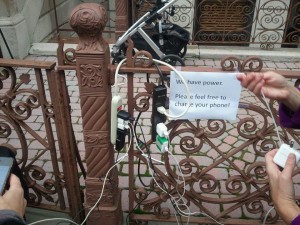Charity, proof scarcity doesn't always increase prices.
 Economic theory states that scarcity increases prices; but, exactly the opposite occurs. People share with their neighbors.
Economic theory states that scarcity increases prices; but, exactly the opposite occurs. People share with their neighbors.
Widespread power outages is the definition of scarcity. The people people without electricity clearly have a need. Why didn’t it lead to massive profit taking? In a real free market there is another choice, it’s call charity.
The person sharing their electricity didn’t have a scarcity, they had an abundance, more than they needed. The value of helping people in need outweighed any monetary profit or the hassle involved in selling access to electricity. This situation shows that given the choice people gladly share. If there isn’t a significant cost involved sharing people will share.
Crowd sourcing math, value of life
When speed limits in the USA were raised from 55 to 65 death rates also increased. The economic value of the lives lost amazingly equaled the average lifetime income.
Everyday people choose between ways to spend their time and money. They calculate the relative value of each and decide which best achieves their goals. Individually these choice can seem haphazard, irrational and even counter productive.
An economic decision is a choice that means giving up thing to get another. Another name is a trade off. Depending on the conditions of a particular situation the relative value changes. A man in a hot desert would more highly value a glass of water than a fancy winter coat. The same man would prefer the coat to the water if he were in the arctic.
Poor people often take great risks to earn a living than wealthier people precisely because it is to enable living. When those same people are wealthier they will take less risks. This is the main reason certain industries have moved from wealthy post-industrial nations to less developed nations. As those nations improve economically those jobs will be replaced by technology.
Ideas for further research.
Compare other risk reward ratios to create a formula between maximum loss, dying, and zero loss. This could explain crime and be useful for determining effective deterrents to crime and enticements to other occupations.
Is Your Product Too Expensive? How to calculate price and cost.
How to price your products to maximize demand and profit and create a strong business strategy using the Predictive Innovation® with Flying Cars as an example



 Predictive Innovation Training
Predictive Innovation Training Predictive Innovation: Core Skills Book
Predictive Innovation: Core Skills Book RoundSquareTriangle.com
RoundSquareTriangle.com